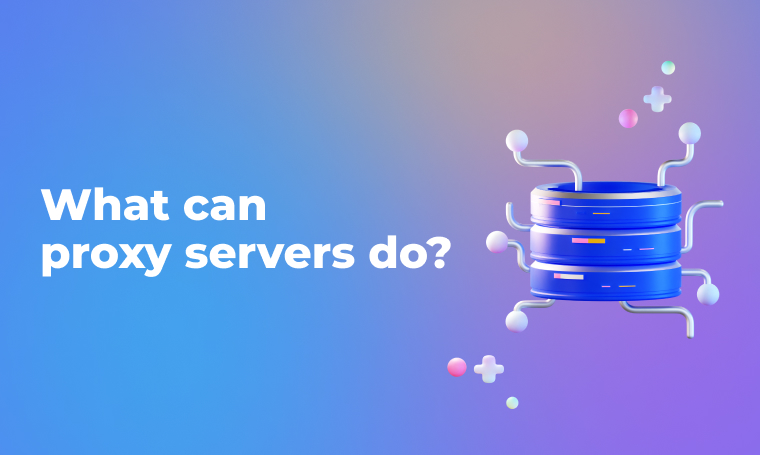In this article we are going to overview what can proxy servers do, the types of proxies, and their importance.
Everyone browses the internet, but many don’t stop to query what goes on behind the scenes. Despite the fact that services on the internet use technologies that continuously collect data, few users think about who they’re watching.
On the internet, data collection proceeds at infinity. Once you access the internet, every activity carries your IP address. The IP (Internet protocol) address is your identity on the web, which anyone who has access to it can use to locate you or make a profile.
Fortunately, there are devices called proxies, whose primary function is to make you anonymous when you browse the internet. With iteration, proxies have gotten even better and offer much more than anonymity. Below we will explore what proxies can and can’t do.
What are proxy servers?
Proxy servers can be software or hardware. Irrespective, they work to sheath your IP address in theirs’, so whenever a website server wants to trace your request, it leads to the proxy server.
To achieve this, proxy servers receive the request whenever you make an internet request, replace your IP address with theirs, and then forward your request to the destination server. Proxy servers respond to requests made by destination servers. In a final trip, the response is displayed on your browser, unscathed.
There are many proxy servers, each with specific strengths, features, and functionality. It becomes pertinent that every user understands what they need a proxy for, which leads to identifying the best proxy server to use.
What can’t proxy servers do?
A modern proxy server has many features, but can only do a few things that internet users want. Though, proxy servers can heighten the performance of tools that meet those other needs.
● For instance, proxy servers can’t encrypt data on their own. Proxy servers only function on the application layer to reroute website traffic and hide IP addresses. Data encryption is a primary function of VPN – Virtual Private Networks. On top of that, there are websites such as VPN.Coupons that provide coupons that can be claimed for discounts on the best VPN services. Read the article here to learn more about VPN capabilities and what VPNs do.
● One other thing proxies can’t do is absolute provision security. There’s no total security on the internet, but proxies make monitoring your activities harder.
Though, proxies can also be their users’ cause of worry. Proxies log user data with every request. Website servers don’t see the user data, but anyone with the skill to hack the proxy service can cart away with proxy servers.
What can proxy servers do?
Proxy servers offer several functionalities based on their features and peculiarities. Hence, pay attention to the details of the proxy you’re signing up for, and ask many questions without refraining.
● Routing internet traffic: this is the primary function of proxies. The rerouting process is to hide the IP address of the user.
● Privacy: When you use a proxy, anyone can still see activities occurring off a certain device. However, your IP address is hidden, so the activity can’t be tied to you.
● Bandwidth management: You can use proxies to save your bandwidth because they cache files and compress traffic to your computer.
● Protection against malware: protection against malware is a critical need of companies and proxies
Common types of proxies
There are numerous types of proxies. These types are grouped based on price, anonymity, protocol, source, exclusivity, presentation, direction, rotation, and IP address version. Each of these classifications yields a couple of differentiated proxies with peculiar features and limitations. When combined, here are the most common types of proxies to use.
Private proxies
These are dedicated proxies allotted to only one user per time. The IP address provided is used by one client. Hence, ensuring efficiency and high performance. It is common practice to use private proxies in order to protect the network of an organization due to their performance. A business that manages several social media accounts and conducts extensive competitor research can also use them. If these are your primary tasks as a business, consider private proxies from one of the market-leading providers.
Rotating proxies
Using these proxies, users’ IP addresses continuously change. Whenever the user makes an internet request, the IP address to the destination server changes. Because no two internet requests going through rotating proxies have the same address, the destination server can’t flag them. Owing to this, rotating proxies are suitable for web scraping.
Static residential proxies
We created static residential proxy servers by combining data centers and residential proxies. A data center proxy’s efficiency is well-known, while a residential proxy’s anonymity is superior. Static residential proxies, hence, combine performance and anonymity.
Common use cases of proxies
Proxies provide anonymity, security, and privacy, which results in them finding use cases in the following areas:
- SEO Monitoring
- Social media monitoring
- Data crawling
- Ad verification
- Data collection
Conclusion
In today’s internet infrastructure, proxies play a crucial role in improving the browsing experience. In order to benefit from a proxy, you need to tailor its services and features to your requirements as an individual user or business. Hence, do diligent research.















